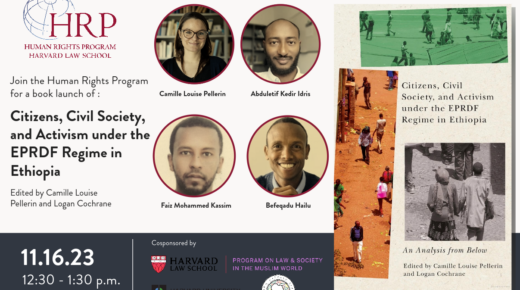Lectures & Panels Citizens, Civil Society, and Activism under the EPRDF Regime in Ethiopia: An Analysis from Below

This book, proposing “an analysis from below,” reverses the the dominant narrative on authoritarianism under the EPRDF regime in Ethiopia, to show that civil society actors were in fact more active participants than suggested by the state-centric view.
Event Overview
Register here for this Zoom event.
The Harvard Law School Human Rights Program will host a book launch and discussion of the edited volume “Citizens, Civil Society, and Activism under the EPRDF Regime in Ethiopia: An Analysis from Below” (McGill-Queen’s University Press 2023).
You can access a 30% discount code through McGill-Queen’s University Press.
The dominant narrative on authoritarianism under the EPRDF regime in Ethiopia, focusing mostly on the authoritarian regime itself, draws a picture in which the regime was acting upon, coercing, and coopting, civil society. This book, proposing “an analysis from below”, reverses the vantage point to show that civil society actors were more active participants than suggested by the state-centric view. Different chapters of the book show civil society actors, including those established by or aligned to the regime, to be resourceful in devising strategies that promoted the interests of their members and beneficiaries by constantly negotiating space through a combination of cooperation, circumvention, and resistance.
Specific topics addressed by the panel will include:
- Urban social-media based protests and resistance to authoritarianism, and human rights and democracy activism;
- A Muslim non-violent protest movement in support of constitutionalism and human rights; and
- The role of civil society in pressing for and supporting the reform of a restrictive civil society regulatory framework.
Panelists:
Camille Louise Pellerin is a researcher at the Department of Government at Uppsala University. Her research focuses on state– society relations, exploring different dimensions of this theme, such as civic activism, trade unionism, democratic reform, and urban protests. Camille has been awarded funding as a co-investigator (Swedish Research Council, 2019-03564) and principal investigator (Swedish Research Council for Health, Work Life and Welfare 2020- 00057) for research on state–labour relations and minimum wage negotiations in Ethiopia. Camille has published articles in international peer reviewed journals such as the Journal for Modern African Studies and Urban Forum as well as chapters in edited volumes for Tsehai Publishers and Brill.
Abduletif Kedir Idris is a PhD candidate at the Max Planck Institute for Social Anthropology in Halle, Germany, and a lecturer at the Center for Human Rights at Addis Ababa University. His research interest areas include intercultural human rights, environmental and indigenous people’s rights, comparative constitutional and administrative law, federalism, and multilevel governance. Abduletif holds a bachelor’s degree in law from Addis Ababa University and a master’s degree in law from the University of Alabama.
Befeqadu Hailu is a writer, blogger, and pro-democracy activist in Ethiopia. He received the PEN Pinter Prize for International Writer of Courage in 2019 and the Burt Award for African Literature in Ethiopia in 2012. He is a co-founder and executive director at the Center for Advancement of Rights and Democracy, an Ethiopian civil society organisation. Befeqadu was also a co-founder of the Zone 9 blogging and activism collective, a winner of the CPJ International Press Freedom Award in 2015. He is a weekly columnist for Deutsche Welle. Befeqadu has spent 596 days in detentions related to his blogging and activism works.
Faiz Mohammed Kassim is an assistant professor of neuropsychopharmacology at the Department of Psychiatry, St Paul’s Hospital Millennium Medical College in Addis Ababa. Faiz has two master’s degrees from Addis Ababa University, one in in philosophy and another in pharmacology, and he received his PhD from University of Western Australia. His research ranges from Ethiopian history to secularism and Ethiopian Muslims. He has published two books, Islamophobia in Ethiopia and Reflections, Re-analysis and Paradigm Shift on Ethiopia History.
The event is organized by the HLS Human Rights Program and cosponsored by the HLS Program on Law and Society in the Muslim World, the Harvard African Law Association, and the Harvard Center for African Studies.